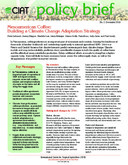| dc.contributor.author | Laderach, Peter | es_ES |
| dc.contributor.author | Haggar, Jeremy | es_ES |
| dc.contributor.author | Lau, Charlotte | es_ES |
| dc.contributor.author | Eitzinger, Anton | es_ES |
| dc.contributor.author | Ovalle, Oriana | es_ES |
| dc.contributor.author | Baca, María | es_ES |
| dc.contributor.author | Jarvis, Andy | es_ES |
| dc.contributor.author | Lundry, Mark | es_ES |
| dc.date.accessioned | 2015-11-18T06:09:15Z | |
| dc.date.available | 2015-11-18T06:09:15Z | |
| dc.date.issued | 2013-05-31 | es_ES |
| dc.identifier.uri | https://repositorio.catie.ac.cr/handle/11554/7982 | |
| dc.description.abstract | In Mesoamerica, coffee production is an important part of economies and societies, forming the backbone of thousands of families’ livelihoods and contributing significantly to national agricultural GDPs. Yet it is in Mexico and Central America that climate forecasts predict severe impacts from climate change. Climate models and crop-niche suitability predictors show considerable changes in both the quality of coffee beans
and the altitudinal zones suitable for production. Unless additional efforts are made to strengthen adaptive capacity today, there will likely be heavy economic losses across the coffee supply chain, as well as the disappearance of important ecosystem services. | es |
| dc.description.sponsorship | CIAT ; CATIE (Centro Agronómico Tropical de Investigación y Enseñanza) | es |
| dc.language.iso | en | es |
| dc.relation.ispartof | Programa Agroambiental Mesoamericano (MAP). Fase I | |
| dc.title | Mesoamerican Coffee: Building a Climate Change Adaptation Strategy | es |
| dc.type | Otros | es_ES |


